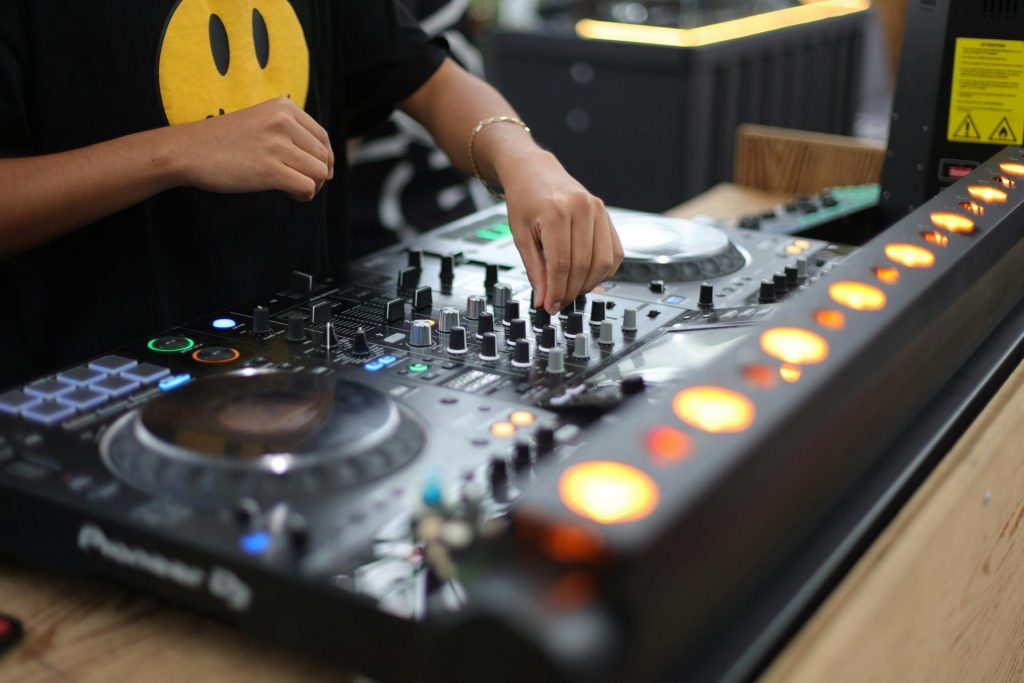
Contrary to what many believe, DJing doesn’t have to be just a hobby. DJs from all walks of life and genres can become full-time career DJs. Regardless of the type of DJing you do, certain principles apply to almost every type of DJ career.

Here are some of the most lucrative types of DJing.
Mobile, Events, and Open Format DJing
There is a lot of work out there for mobile and open format DJs who play a variety of well-known hits from multiple genres. You don’t have to be rich, famous, connected, or have an Instagram following. This broad category of DJing includes weddings, corporate events, private parties, coming-of-age parties, nightlife gigs, restaurants, and more. It’s great to have a large and varied body of charting and classic songs that span genres, so work on building up a vast DJ music library. It’s also good to hone your technical mixing and transition skills.
Additionally, familiarizing yourself with the standard structure of events, such as weddings, will increase your earnings and hiring potential. Become a great public speaker and adept at interfacing with all different customers and vendors in the events space. That way, you will get strong reviews and referrals to new customers.
Depending on your market, corporate and private event DJ gigs can pay at least $100 per hour, and weddings can pay over $1000 per gig, so it’s possible to cover your living expenses with just a few gigs each month. You can also upsell services including lighting, music videos, karaoke, and emceeing. The higher-paying open format gigs tend to require you to provide your own sound equipment, so it’s best to invest in a good pair of speakers as well as other portable gear. For more information about the gear mobile DJs need, check out this article.
Radio DJ
If you want to speak on air or mix songs for radio play, you can apply to job listings from companies like iHeartMedia and Audacy. While there are a variety of DJ jobs to choose from, radio DJ jobs are steady, have regular working hours, and can be salaried jobs with great benefits.
DJ/Producer Hybrid
DJs who make their own music not only make money from ticket sales and booking fees for live gigs, but they can earn money from music royalties, sync placements, and producing music for other artists. The most successful DJ/producers are great at building their own brand, style, and following. This allows them to command higher prices to DJ live. Check out more jobs for producers and musicians in this article.
Electronic & EDM DJ
There is a market for DJs who specialize in spinning electronic, house, and EDM music. Club and festival organizers tend to hire a roster of DJs to perform these genres of music at raves, and many more related subgenres. While entry-level open format and mobile gigs tend to pay better than EDM gigs to start, it also depends on the market. Electronic and EDM gigs opening for well-known DJs can be very lucrative. It is also possible for an EDM DJ, regardless of how famous they are, to make good money if they know how to promote their own party.

Best practices for making a living as a DJ.
Cover your expenses.
Most forms of DJ work are considered self-employment or business income, so it’s best to secure a steady stream of gigs for yourself from multiple clients and keep your living expenses low. Write a budget and determine how much you need to make in DJ income to meet or exceed your living and business expenses. If you really want to be a full-time DJ, when you are first building your DJ business, you may have to cut out unnecessary memberships and leisure purchases to keep your monthly expenses low.
Also, cover your bases in case clients are slow to pay. Ask for deposits upfront and have enough savings to cover your expenses when a client is late on a payment.
Know your worth.
Stand your ground and know your worth when negotiating for rates. DJing requires a huge upfront investment of time, education, and equipment. Good DJs are few and far between, and there is a difference in quality between a DJ who invests in themselves and one who loads a bunch of songs onto a laptop and clicks ‘play’.
Know your strengths and yourself well enough to communicate the value you as a DJ bring to an event or party. Some clients don’t recognize your worth and will want to pay you low rates because DJing is fun or because others have accepted minimum wage just to be on stage. If you’re talented and dedicated, most clients will pay you your worth. Your time is valuable, especially if you’re planning on making a living as a DJ. If you accept less than you’re worth, you’ll have to supplement your DJ job with other income streams.
Work hard even when you’re not DJing a gig.
Be self-disciplined. When you are not working, you may need to spend your time securing new gigs. That means updating your online presence, reaching out to new clients, attending shows in your music genre, going to wedding expos, and so forth. Ideally, you would have enough work that you don’t have to market yourself at all, and all your gigs come from referrals or booking agents, but it takes time for people to get to know you and your work. Initially, you will probably have to cold-call a lot of potential clients. Put aside time every week to work on your marketing.
Diversify your income streams.
In certain months, regular physical gigs may be slow, so it’s best to save up during busier months and consider alternative income streams. Consider becoming an online/livestream DJ, providing audio and mixing services, or giving DJ lessons during slower months. DJs can also earn extra income from merchandise sales and social media endorsements. For more information about how to make money from livestreaming, check out this article.
It’s certainly possible to make a full-time living as a DJ, and your earning potential will also grow as you build your brand and your sound. As music and technology evolve, so will the art of DJing and the type of DJ and music gigs available. It’s important to stay flexible and adapt to market trends. In addition to staying adaptable, it’s important to work on your brand and determine what makes you stand out as a DJ. Doing so will allow you to charge higher rates for your services and therefore allow you to not only survive full-time as a DJ, but thrive.

